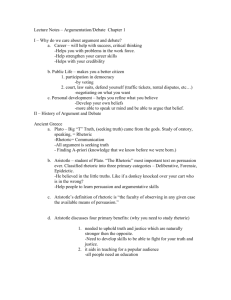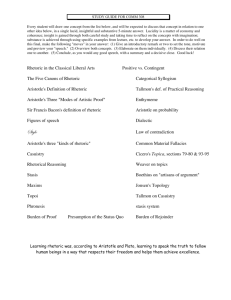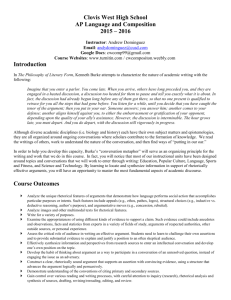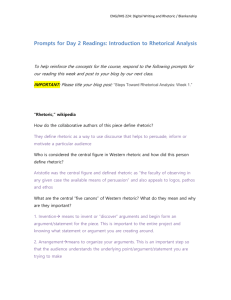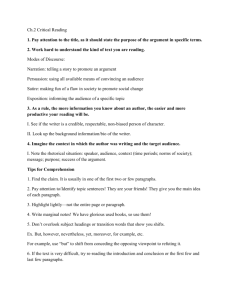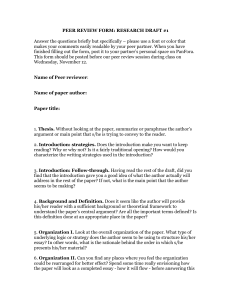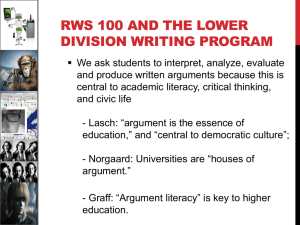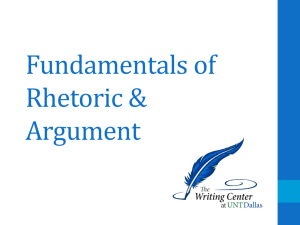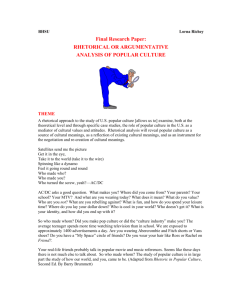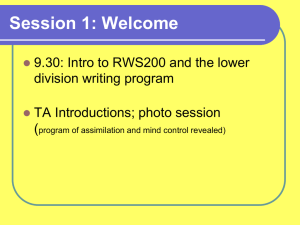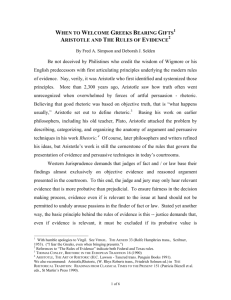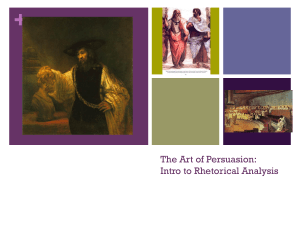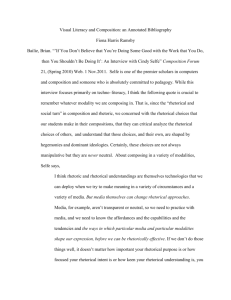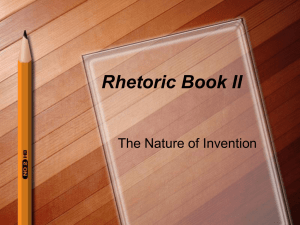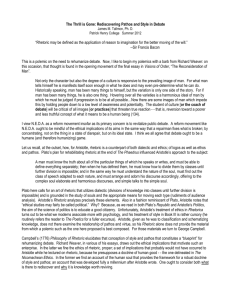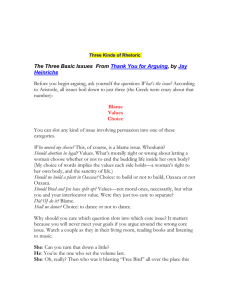Rhetorical Analysis
advertisement
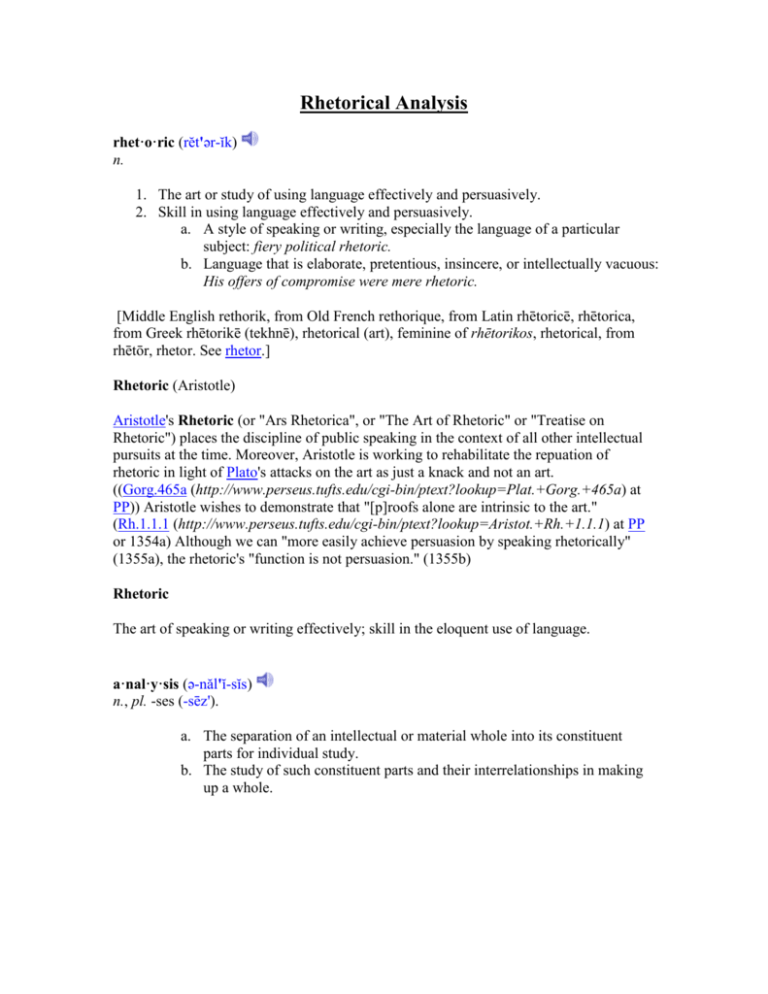
Rhetorical Analysis rhet·o·ric (rĕt'ər-ĭk) n. 1. The art or study of using language effectively and persuasively. 2. Skill in using language effectively and persuasively. a. A style of speaking or writing, especially the language of a particular subject: fiery political rhetoric. b. Language that is elaborate, pretentious, insincere, or intellectually vacuous: His offers of compromise were mere rhetoric. [Middle English rethorik, from Old French rethorique, from Latin rhētoricē, rhētorica, from Greek rhētorikē (tekhnē), rhetorical (art), feminine of rhētorikos, rhetorical, from rhētōr, rhetor. See rhetor.] Rhetoric (Aristotle) Aristotle's Rhetoric (or "Ars Rhetorica", or "The Art of Rhetoric" or "Treatise on Rhetoric") places the discipline of public speaking in the context of all other intellectual pursuits at the time. Moreover, Aristotle is working to rehabilitate the repuation of rhetoric in light of Plato's attacks on the art as just a knack and not an art. ((Gorg.465a (http://www.perseus.tufts.edu/cgi-bin/ptext?lookup=Plat.+Gorg.+465a) at PP)) Aristotle wishes to demonstrate that "[p]roofs alone are intrinsic to the art." (Rh.1.1.1 (http://www.perseus.tufts.edu/cgi-bin/ptext?lookup=Aristot.+Rh.+1.1.1) at PP or 1354a) Although we can "more easily achieve persuasion by speaking rhetorically" (1355a), the rhetoric's "function is not persuasion." (1355b) Rhetoric The art of speaking or writing effectively; skill in the eloquent use of language. a·nal·y·sis (ə-năl'ĭ-sĭs) n., pl. -ses (-sēz'). a. The separation of an intellectual or material whole into its constituent parts for individual study. b. The study of such constituent parts and their interrelationships in making up a whole. Breaking Down a Rhetorical Essay into its parts Author: Who is this person? Researching and constructing a biography about them. Audience: Who specifically is the author writing to? What examples can you find to support this audience? Purpose: Why are they writing this? Find the thesis and you have the purpose. Logos-A Logical Argument: What does the author write/say that makes ‘sense’ (Facts, statistics, reason, etc)? What are examples and explain the example. Pathos-An Emotional Argument: What does the author write/say that gets you emotional? What are examples and explain the example. Ethos-The Character Argument (The Author’s Argument): Rethinking the American Dream: http://www.cof.orst.edu/cof/extended/sustain/index.php Steve Dodrill Title Associate Professor and Multimedia Specialist Programs Groups Agricultural Experiment Station, College of Agricultural Sciences, Extension & Experiment Station Communications, OSU Extension Service Office Extension & Experiment Station Communications 422 Kerr Administration Building Corvallis, OR 97331-2119 Author: Who is this person? Researching and constructing a biography about them. Viviane Simon-Brown Associate Professor Coordinator, The Sustainable Living Project at OSU Forestry Extension, Forest Resources Peavy Hall A007 Corvallis OR 97331 541-737-3197 phone 541-737-3008 fax viviane.simon-brown@oregonstate.edu BA in Science and Foreign Languages: French, Portland State University, 1974 Executive Masters in Public Administration, Lewis & Clark College, 1991 Thesis: A Study of the Effectiveness of Chamber of Commerce Community Leadership Programs Extension and research interests: Integrating three aspects of the human dimensions of natural resources sustainability: … Sustainable living education to help individuals and families make intelligent, thoughtful quality of life and consumer choices about natural resources; … Public engagement to better understand the public's natural resource values and beliefs systems; and … Collaborative public processes that move people from conflict and promote direct and meaningful natural resources decision-making. http://www.forestry.oregonstate.edu/cof/extended/sustain/ Audience: Who specifically is the author writing to? What examples can you find to support this audience? Purpose: Why are they writing this? Find the thesis and you have the purpose. Rethinking the American Dream is designed to raise awareness about our nation’s consumptive ways, help viewers evaluate their current lifestyles, and introduce choices that can improve our natural environment and quality of life. Logos-A Logical Argument: What does the author write/say that makes ‘sense’ (Facts, statistics, reason, etc)? What are examples and explain the example. Pathos-An Emotional Argument: What does the author write/say that gets you emotional? What are examples and explain the example. Ethos-The Character Argument (The Author’s Argument):

